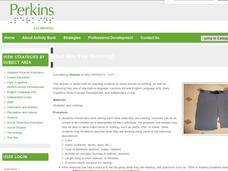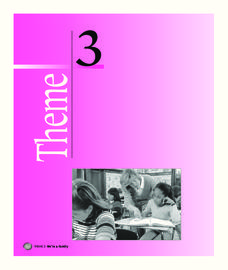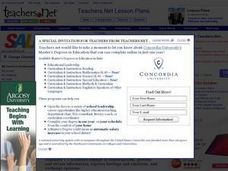Curated OER
Lesson 6: Mittens, Socks, Mittens, Socks, Mittens!
Mittens and socks, two of my favorite clothing items! Young learners with special needs, explore clothing appropriate for cold weather. They identify both socks and mittens, discuss weather appropriate clothing, and listen to the...
Curated OER
Home Living/Daily Living: Selecting an Outfit
When people make clothing choices, they should be attempting to buy clothes that are the proper size. Unfortunately, for most that is a skill that they have never been taught. Make sure your special education learners can purchase...
Curated OER
Home Living / Daily Living: Dressing for the Weather
What to wear? Help your special needs class make independent choices about what they should wear during various weather conditions. They'll discuss weather-appropriate clothing, dress dolls for the weather outside, and even put on a...
Curated OER
Travis the Train and the Sunny Day
Get your special-needs students thinking about weather appropriate clothing choices with this sunny day social story. Print this resource or use as a slide-show to show children what people wear when its a hot and sunny day. Tip: Use...
Curated OER
Seasons and Clothes
In this English worksheet, students match appropriate clothing with the seasons. Students are given a list of choices and must choose which clothing is best for the weather of the given season.
Curated OER
Africa - Clothing
Third graders discuss the differences between the clothing choices within the three regions in Africa and in Hawaii.
Perkins School for the Blind
Learning Names of Articles of Clothing
What to wear today; such a vexing question. Spend some time introducing the names, fabrics, types, colors, and functions of various articles of clothing to your class. Each child will take turns asking each other what they are wearing....
Curated OER
Label the Clothes
In this identifying articles of clothing belonging to a male and female worksheet, students use words in the word bank to label the names of the clothing on the appropriate lines in English. Students write 15 answers.
Curated OER
Clothes
In this parts of speech online interactive worksheet, students choose the appropriate multiple choice word to describe 9 pictures of clothing. Students type in a word to describe 3 additional pictures of clothing. Students fill in...
Curated OER
Quel temps fait-il?
Hit all the basics with this lesson, focusing on weather, greetings, and dates! Start by singing a weather related song ("Quel temps fait-il by Barbara MacArthur is suggested), and then read a story about getting ready for school. The...
Curated OER
Wet or Dry
What should you wear when it's wet and what should you wear when it's dry? Your little learners can yell out the answer as each slide progresses. They'll see images of clothing items typically worn during wet and dry weather and discuss...
Curated OER
Winter Clothing
After listening to a reading of The Snowy Day, by Era Jack Keats, language learners use a SMART board and drag the appropriate vocabulary word to the correct clothing article. They then record and illustrate the new vocabulary words in...
Curated OER
What Do I Wear in the Winter?
Students identify the appropriate clothing to wear in the winter. In this seasonal weather lesson, students discuss what warm and cold weather feels like and what clothing is necessary during the specific seasons. Students explore...
Houghton Mifflin Harcourt
We’re a Family: English Language Development Lessons (Theme 3)
Teach your English language learners how to talk about their families with three weeks of lessons. Over the course of the thematic unit, learners pick up new vocabulary so that they can talk about families and relationships, clothing,...
Curated OER
What to Wear?
For this decision making worksheet, students complete 5 problems in which clues to the daily weather are read and appropriate clothing is chosen. Temperatures are in degrees Fahrenheit.
PJ Library
Joseph Had a Little Overcoat
Teach children that just because something is old, doesn't mean you have to throw it away with a reading of Joseph Had a Little Overcoat by Simms Taback. Engaging children with an arts and crafts activity in which they patch the...
Curated OER
Coming Full Circle
Students develop and design their own clothing line in this Visual Arts lesson about the intricacies of the fashion world. Emphasis is placed upon current and vintage designs, famous designers, and the development of individual design...
Curated OER
Categorizing Objects
Kindergartners practice the important skill of placing things in their correct categories. They must discern between items of clothing and items of food. The use of the Inspiration 7 educational software is effectively used in this...
World Health Organization
Sun Protection
Primary graders become sun scientists and conduct experiments to learn about the beneficial and harmful effects of the sun and UV radiation. They also investigate their personal sunburn danger zones and learn about how to protect...
King Country
Lesson 2: Private & Public
What is the difference between a private and a public place? The focus in this second lesson on family life and sexual health is building an understanding of the difference between the concepts of private and public and the...
Curated OER
What Do I Wear Out Here?
First graders identify the components of a modular spacesuit. In this astronaut clothing lesson, 1st graders discuss the importance of appropriate clothing for working in space. Students define the term modular and explore an...
Curated OER
Describing Clothes and Shopping
In this clothes and shopping activity, students label clothes, rewrite sentences, fill in verbs to sentences, and more. Students complete 6 activities.
Curated OER
Spanish Colors and Clothing
Students practice Spanish words for colors and clothing through a variety of activities. The clothing that they are wearing becomes a medium for vocabulary review and part of the lesson's content.
Roy Rosenzweig Center for History and New Media
American Indians and their Environment
People could take a page in ingenuity and survival from the Powhatans. Deer skins became clothes, and the members of the Native American group farmed the rich Virginia soil and hunted in its forests for food. Using images of artifacts...

























